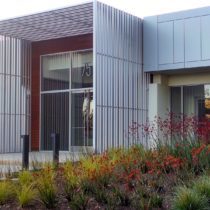Landscape Architecture for Landscape Architects › Forums › GENERAL DISCUSSION › LEED and other Certifications/Qualifications for LA’s
- This topic has 1 reply, 5 voices, and was last updated 13 years, 7 months ago by
 Theodore Tegen.
Theodore Tegen.
-
AuthorPosts
-
September 7, 2010 at 3:36 am #167862
 Wes Arola, RLAParticipant
Wes Arola, RLAParticipantAside from qualifying and taking the LA license exam, I am looking to build my resume and qualifications as I have completed a few years in the profession. What are some suggestions as far as certifications and professional development which will be respected/valued in the eyes of employers in the field?
Is LEED certification really that valuable or is it just a “badge or title” which looks good on your resume as a LA?
September 7, 2010 at 3:16 pm #167868 Theodore TegenParticipant
Theodore TegenParticipantI think LEED accreditation is a valuable certification, at least I have found it to be. I feel that it has done more as a “badge or title” than it has in practical applications though. It is one of those things that puts you ahead of the competition, or at least on par with the competition when it comes to vying for projects. However, when you begin actually working on a LEED project, having the AP accreditation will help get you involved with various aspects of the project, not simply those related to landscape architecture.
Another certification I have found that has helped me out when competing with other LA’s is a state or regional horticulture certification. In Minnesota it is the MNLA (MN Nursery and Landscape Assn) Certified Professional. Oddly, not a lot of LA’s have much background in horticulture, so this certification can set you apart because you have a deeper (or at least documented) understanding of plants/soils/diseases/etc.
September 8, 2010 at 6:11 pm #167867Pat S. Rosend
ParticipantIt depends on what employment track you are planning on taking. For Office/Municipal I would recommend an AICP cert. For design/build I would go more construction certification/project manager. Certified Playground designer is also good for somethings. I have seen little value in LEED for design/build or municipal works. Maybe more in private design. Architects seem to gain more value from that cert.
September 9, 2010 at 1:32 pm #167866 Denise Y. O’Meara, ASLA, LEED APParticipant
Denise Y. O’Meara, ASLA, LEED APParticipantIf you are working in commercial, institutional, public doman, planning and development, even residential, you need to get yourself LEED accredited (buildings/projects are certified, practitioners are accredited), especially if you are working in a multidisciplinary firm. LEED is not the end all-be all of sustainability but it is in the forefront of sustainable design. As municipalities, governments and individual developers accept the necessity for an overriding and accountable ‘green’ method of planning and building, LEED and similar sustainability systems become more and more valuable. What LEED has done that is most valuable is create a workable system that gives credibility to sustainable design, and when the force of ordinance or legislative requirement is behind it, the power to channel funds in the right direction – sustainability can no longer be ignored due to budget.
The exam is hard (covers a lot of areas that can be foreign to LA’s (such as mechanical HVAC system requirements, etc), so it requires extra diligence in preparation. I am hoping that one of these days, ASLA’s Sustainable Sites Initiative will become its own separate area of LEED expertise, as is LEED for Interiors.
There are lots of new accreditations/certifications out there now, such as for green roofs, erosion and sedimentation management, etc. If you are working in planning and land development an AICP would certainly be of benefit. But whether you gain certifications/accreditations or not, the process of seeking and learning new information on a continuing basis will benefit you both personally and professionally.
September 29, 2010 at 9:17 pm #167865 Jordan LockmanParticipant
Jordan LockmanParticipantHave you looked at Leed ND? That seems to apply the most to LA’s.
September 30, 2010 at 1:19 pm #167864 Denise Y. O’Meara, ASLA, LEED APParticipant
Denise Y. O’Meara, ASLA, LEED APParticipantHello Jordan,
Yes, I have reviewed the LEED ND certification requirements and system. It is certainly more context oriented than LEED versions for new and existing buildings. These have improved, site-wise, with the 2009 building versions, nearly doubling the available points for sustainable site elements. The ND version sections on conservation are more advanced than anything in the building versions, and I think that these, as well as the far more developed community connectivity points could and should be incorporated in LEED for new and existing buildings. Our firm does mostly institutional buildings (education, etc.) and not community development, thus my personal focus on LEED BC+D. I think if the new LA is looking in the community development/planning/housing arena, the ND version would be much more useful to them.
I would really like to see the full sustainable sites initiative incorporated into LEED as a stand alone version, and hope that happens soon.
We have also been discussing the value of obtaining CPESC (Certified professional in erosion and sediment control) certification. The engineers have been discussing the need to be certified as such since they already do that type of design (as do LA’s), and I don’t know what the upshot of that discussion has been. The way I look at is, if it makes the municipalities more comfortable with our qualifications to do that work, it might certainly be of benefit to LA’s, and the training seems to be more readily available now. Of course, there are the associated costs of training, the exam and yearly renewal fees, as well as a rather extensive requirement for professional development CEU’s (60 units over 3 years) which, when added to LA and LEED AP plus CEU requirements and whatever else you are accredited or certified for, would be rather daunting to fulfill!
September 30, 2010 at 1:48 pm #167863Pat S. Rosend
ParticipantThank you for commenting on the fees associated with various certifications. They add up quickly.
-
AuthorPosts
- You must be logged in to reply to this topic.

